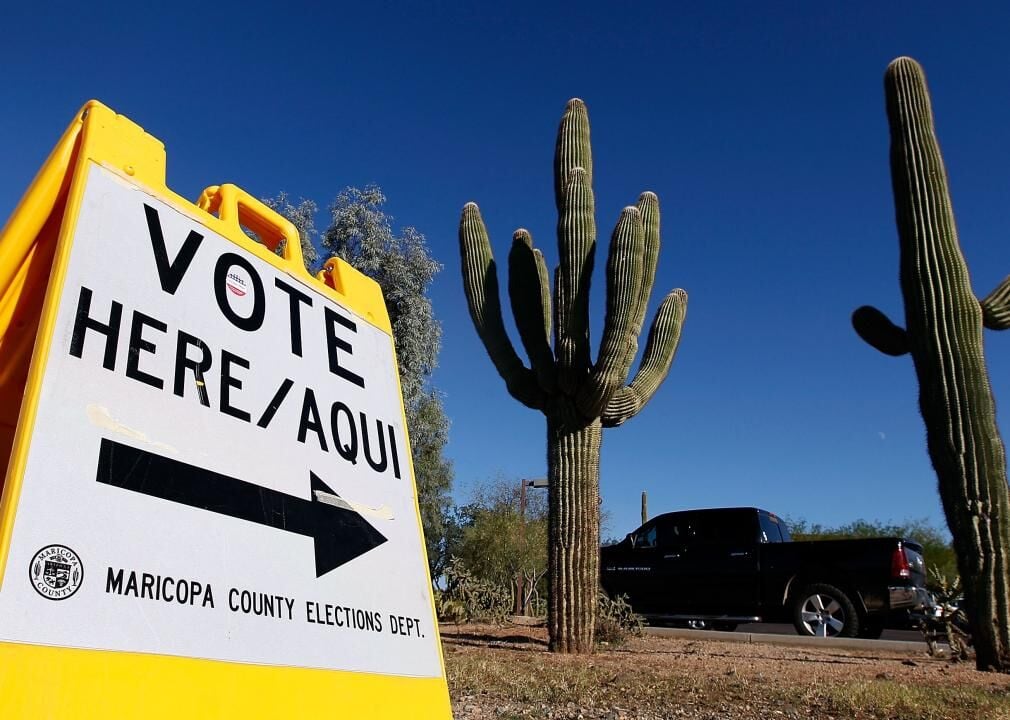PHOENIX — Gov. Doug Ducey has vetoed legislation which would have required county election officials to cancel the registration of anyone they determine is not qualified to vote.
The move Friday, the first by the governor this session, came amid concerns from county officials that what was in HB 2617 could lead to mischief as it would allow individuals to make unsubstantiated claims that some people on the voter registration rolls should be removed. Jennifer Marson, executive director of the Arizona Association of Counties, said that, in turn, would trigger automatic investigations.
Marson, in a letter Friday to Ducey, also pointed out what she said were illegal provisions in the measure.
The governor, in his veto message, said he agrees.
"The implementation of this provision is vague and lacks any guidance for how a county recorder would confirm such a determination," Ducey wrote.
"Our lawfully registered voters deserve to know that their right to vote will not be disturbed without sufficient due process," he continued. "This provision leaves our election system vulnerable to bad actors who could seek to falsely allege a voter is not a qualified elector."
HB 2617 was sponsored by Rep. Joseph Chaplik, R-Scottsdale, who called it "a simple, common-sense election integrity bill to help clean up the voter-roll maintenance."
"It should be going on already," he told colleagues. "We have to pass this to obviously have the county do their work."
But it also is being pushed by the business-oriented Arizona Free Enterprise Club, the same group that worked to convince the Arizona Supreme Court to block voters from having a say on a $1.9 billion tax cut where the majority of the proceeds would have gone to the most wealthy. The organization also is behind a ballot measure to add additional requirements on those who want to vote by mail.
"The first step in election integrity is ensuring clean and current voter rolls," said Greg Blackie who lobbies for the organization. And that, he said, requires not just ensuring that people are legally qualified to vote but also "regular maintenance to ensure that people who are no longer qualified, whether due to death, felony conviction, residency status or for other reasons are regularly removed."
In a written statement, Chaplik called the veto "shocking."
"I worked directly with the gov's office on the Senate amendment language for the bill," he said. "I was never told they didn't like the language we all worked on."
And Chaplik took a shot at the governor's staff.
"This is a failure of communicating from his office and working together as a party to be efficient and effective with passing strong policy for election integrity," he said.
But gubernatorial press aide C.J. Karamargin said the lawmaker knows the reasons for the veto.
Some of what was in HB 2317 was fairly straightforward, like saying that people should be deleted from Arizona voting lists when they get a driver's license in another state.
Another provision required court officials to forward to recorders a list of people who ask to be excused from jury duty because they are not citizens.
Marson, however, told the governor it's not that simple.
"County recorder's offices are not designed to be investigative bodies," Marson wrote to Ducey.
"Yet this bill allows anyone, without any evidence, to simply give a list of names of those suspected to be improperly registered to the county," Marson continued. "And the county must take a variety of steps to confirm if the person should be registered."
In fact, she said, one provision even allows for verbal complaints, with nothing more.
"A person could call in or submit claims anonymously," Marson said. "Counties would have no mechanism to track or halt bad actors who use this new law to report, without any evidence, anyone they believe to be suspicious."
And she said there are other problems.
It would have required county records, on a monthly basis, to compare a list of registered voters who they have "reason to believe are not United States citizens" with records maintained by the United States Citizenship and Immigration Services."
"Upon what is that based?" Marson asked about what would give recorders that reason to believe. "It is up to each recorder to decide?"
And then there was the provision that required county recorders to determine if a person actually lived where he or she said. The vagueness of that clearly bothered Ducey.
"There are certain aspects of being a qualified elector are objectively quantifiable, such as age and citizenship status," he wrote.
"But the determination of residency can be a fact-specific inquiry," the governor continued. "The subjectivity of this provision, as well as a lack of guardrails against false claims, included in HB 2617, leaves voter registration susceptible to being canceled based on fiction rather than fact."
Marson also said the questions of illegal registration are the purview of county and state prosecutors, including an Election Integrity Unit within the Attorney General's Office, saying any of those "would be a more appropriate entity to determine if voter fraud is occurring."
There were things in Chaplik's bill that the governor said he liked.
"For example, requiring the Department of Transportation to notify the secretary of state when a registered voter receives an out-of-state license is a step forward in maintaining accurate voter rolls," Ducey wrote.
"Moreover the process outlined in the bill that describes how counties are notified when a prospective juror is not a U.S. citizen also provides tools to make sure only qualified electors are participating in Arizona elections," he continued. And the governor indicated he would sign such a bill into law containing that measure.
Chaplik, in explaining the measure, said nothing in HB 2317 would automatically remove anyone from the voter registration rolls. Instead, it would have required county recorders to send a notice to who appear to not be legally registered telling them their registration would be canceled in 90 days unless they provide "satisfactory evidence'' of qualification.





